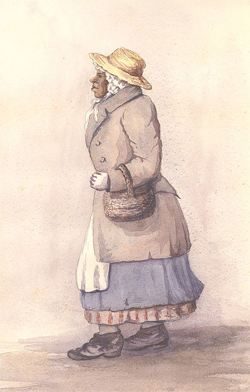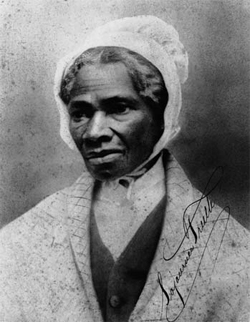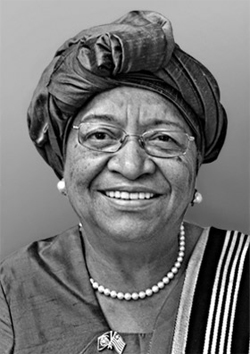“A great leader is an ordinary person with extraordinary wisdom” – African Proverb
Rose Fortune
Rose Fortune was born in Virginia, USA in 1774 to enslaved parents. At the age of 10, she immigrated to Nova Scotia as a Black Loyalist. Her family settled in the Annapolis Valley with the promise of freedom and land from the British. However, the land they received was not farmable and making a living was almost impossible, but despite the hardships, Fortune never gave up. Eventually, she became a successful entrepreneur, operating a profitable business on the docks as a baggage carrier using a heavy wheelbarrow. This business thrived over the years and Fortune’s transport business remained in the family until 1965. Fortune became Canada’s first Black policewoman in 1825 when she was entrusted to enforce the law on the wharfs by imposing curfews at local ports and keeping the peace in Annapolis Royal. Her legacy lives on today in the form of a scholarship created in her name by the Association of Black Law Enforcers. Her descendants include the late Daurene Lewis, the first Black female mayor in North America elected in 1984 to this position in Annapolis Royal.
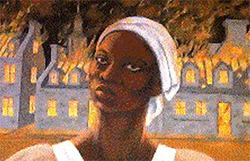
Marie-Joseph Angelique
While many choose to believe that the enslavement of African people in North America happen only in the United States, it is far from being true. In the 1800s, Canada was regarded as a place of freedom with many coming to this country through the Underground Railroad. However, in the 1700’s, Canada (then New France and the British Colonies) practiced the legal institution of enslavement. Marie-Joseph Angelique was a slave in Montreal, Quebec. Born in Portugal in the early 1700’s, Angelique rebelled against slavery and sought her freedom from her masters on several occasions. Upon hearing that she would be again sold, Angelique tried to escape and on April 12, 1734 a fire was set that destroyed a large section of the city of Montreal. With a large amount of speculation towards her because of her threats, Angelique was accused and found guilty of arson. Sadly in June of 1734 at the age of 28 years old, she was executed for a crime which she may not have committed. Her life, trial and death highlight the injustice, racism and inequality of an unjust justice system. Marie Joseph-Angelique died tragically, but her life and legacy are symbols in the African Canadians’ struggle for freedom, justice and equality.
Sojourner Truth
Sojourner Truth was an ex-slave who fought for the abolition of slavery and for the recognition of women’s rights in the 1800’s. Born around 1797 in Ulster County, New York, in 1826 she escaped to freedom and in 1843, changed her name from Isabella Baumfree to Sojourner Truth. A brave, determined woman, Truth was a devoted Methodist who travelled widely speaking out against slavery and advocating for women’s rights and prison reform. In 1850, Truth published her memoirs under the title “The Narrative of Sojourner Truth: A Northern Slave.” A passionate speaker, she spoke at the National Women’s Rights Convention in Massachusetts in 1850 and the next year at the Ohio Women’s Rights Convention in Akron, she delivered the famous “Ain’t I a Woman?” speech where she argues that because she is Black and a former slave no one has helped her with anything, and she is a woman. The irony in her efforts for suffrage is that although she fought for women’s right to vote and when finally granted, Truth could not vote because she was Black. During her life Sojourner Truth worked tirelessly for equality for all people. Although threatened with jail, enslavement and even death, she did not stop fighting for truth and freedom. Sojourner Truth died peacefully in her home on November 26th, 1883 in Michigan.
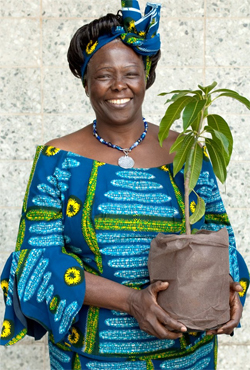
Wangari Muta Maathai
Wangari Muta Maathai (1 April 1940 – 25 September 2011) was a Kenyan environmental and political activist. She was educated in the United States at Mount St. Scholastica (Benedictine College), Kansas; University of Pittsburgh; and the University of Nairobi in Kenya. In the 1970s, Maathai founded the Green Belt Movement, an environmental non-governmental organization focused on the planting of trees, environmental conservation, and women's rights. She was the first African woman to receive the Nobel Peace Prize for "her contribution to sustainable development, democracy and peace". Maathai was an elected member of Parliament in Kenya and served as assistant minister for Environment and Natural Resources in the government of President Mwai Kibaki between January 2003 and November 2005. An Honorary Councilor of the World Future Council, Maathai died of complications from ovarian cancer in 2011. During her tenure with her environmental group, it is said that more than 30 million trees were planted!
Ellen Johnson Sirleaf
Ellen Johnson Sirleaf (born 29 October 1938) is the 24th President of Liberia, elected in 2005. She served as Minister of Finance under President William Tolbert and held senior positions at various financial institutions from 1979 until the 1980. Sirleaf is the first elected female head of state in Africa and was awarded the 2011 Nobel Peace Prize, jointly with Leymah Gbowee of Liberia and Tawakel Karman of Yemen. The women were recognized "for their non-violent struggle for the safety of women and for women's rights to full participation in peace-building work." Sirleaf was conferred the Indira Gandhi Prize by President of India Pranab Mukherjee on 12 September 2013 and is listed as the 70th most powerful woman in the world by Forbes in 2014.

